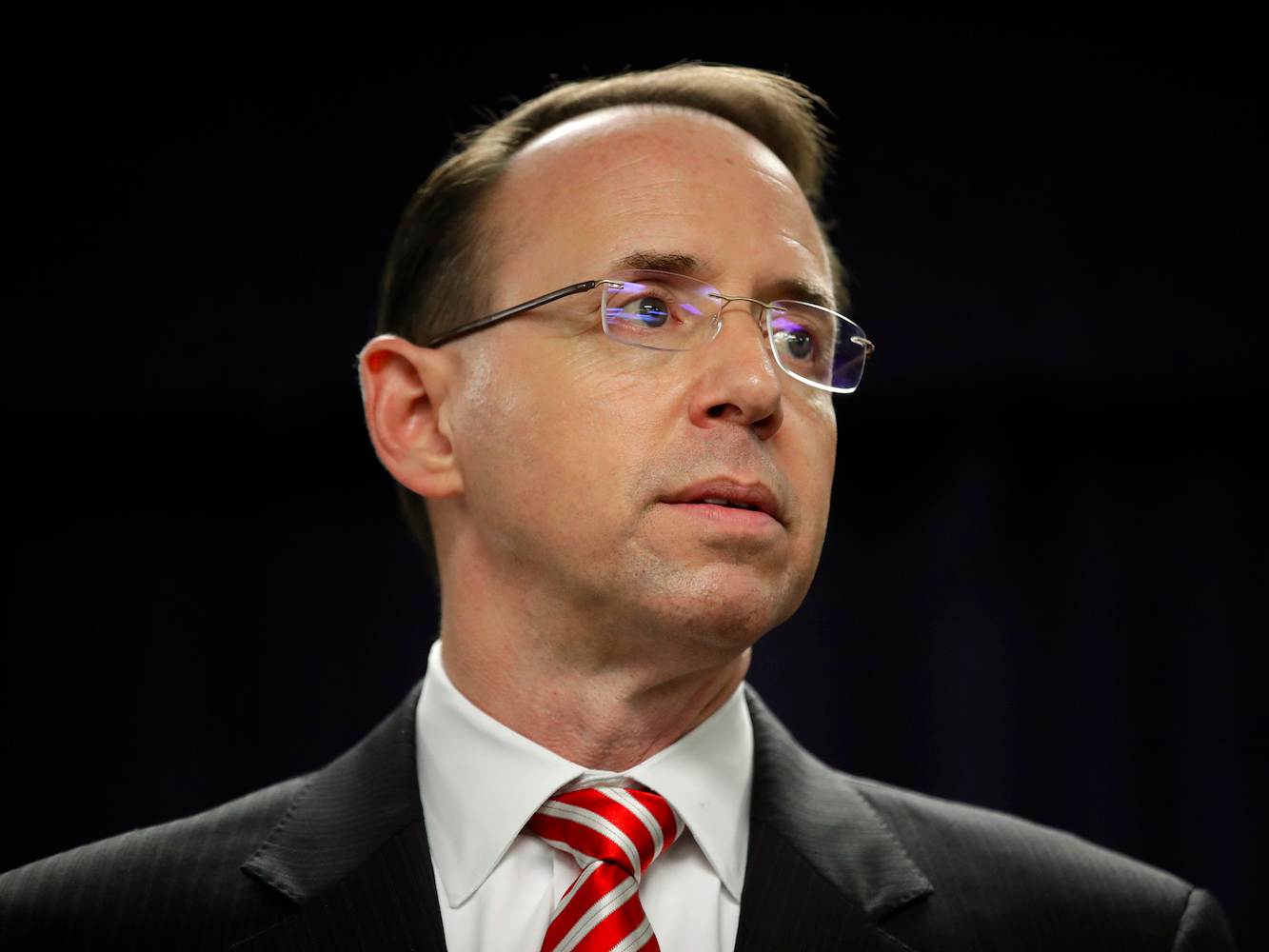- US Deputy Attorney General Rod Rosenstein issued a statement Thursday night that appeared to reference leaks and urged Americans to be skeptical of “stories attributed to anonymous ‘officials.'” The statement caused alarm for its tone amid a Russia investigation that has increasingly riled up President Donald Trump and called into question whether he attempted to obstruct justice. Trump’s allies reportedly are worried they are unable to calm the president’s anguish.
Deputy Attorney General Rod Rosenstein issued a statement Thursday night that appeared to be a rebuke of intelligence leaks roundly criticized by President Donald Trump and Republicans.
It said Americans should think twice “before accepting as true any stories attributed to anonymous ‘officials.'”
“Americans should be skeptical about anonymous allegations,” Rosenstein said. “The Department of Justice has a long-established policy to neither confirm nor deny such allegations.”
Trump, his surrogates, and conservative lawmakers have made intelligence leaks their focus amid a broad FBI investigation into Russia’s interference in the 2016 election. The probe, headed by special counsel Robert Mueller, is examining whether the Trump campaign colluded with the Kremlin to help get Trump elected.
In the latest instance of damaging leaks for the Trump White House, The Washington Post reported on Wednesday that Mueller’s investigation was also examining whether Trump obstructed justice when he fired FBI Director James Comey last month.

Changing the Russia narrative
The Trump-Russia investigation has taken multiple twists and turns since it launched nearly one year ago. Along the way, news outlets have reported on its elements, often citing unnamed US government officials.
Trump has frequently railed against such anonymous sources, at times calling them "fake" or "phony." On Thursday, he referred to the investigation as a "witch hunt."
Trump's surrogates have followed the president's line of criticism, which has propagated across cable news and conservative media outlets.
Attorney General Jeff Sessions decried such leaks in Senate testimony he gave on Tuesday. He said in his opening statement: "These false attacks, the innuendo, and the leaks, you can be sure, will not intimidate me."
Nevertheless, the tone of Rosenstein's statement sparked some pointed questions and analysis on social media:
Bizarre Rod Rosenstein statement on sources makes sense if he's channeling/speaking for Trump. @NYT & @washingtonpost check stories w/ DOJ
— David Cay Johnston (@DavidCayJ) June 16, 2017
Rosenstein's statement clearly came from trump. Why, when this clown potus says "jump", does rod say "how high"? 🤔🤔🤔🤔🤔
— Steven Pasquale (@StevePasquale) June 16, 2017
A statement by US Deputy Attorney General Rod Rosenstein which absolutely no one can make any sense of. pic.twitter.com/zBKVJydN4S
— Paul Danahar (@pdanahar) June 16, 2017
https://twitter.com/mattyglesias/status/875538009998938112
Between this bizarre statement—and equally bizarre explanation of Comey firing—hard to conclude Rosenstein's integrity isn't compromised. pic.twitter.com/W2rtMoLZ7b
— Matt McDermott (@mattmfm) June 16, 2017
Pursuing leakers
Trump administration officials have vowed to pursue people who leak information to reporters. One of the first examples of that came last week when a 25-year-old National Security Agency contractor named Reality Winner was charged with leaking top-secret information to journalists.
Trump called Comey a "leaker" after the former FBI director testified before the Senate Intelligence Committee earlier this month that he shared with a friend a memo he wrote documenting an encounter with Trump in which Comey said Trump attempted to persuade him to end the investigation into former national security adviser Michael Flynn.
That friend, a Columbia professor, shared the memo with The New York Times. Comey said he believed that once public, the memo would prompt the appointment of a special counsel.
It did. Mueller was appointed to oversee the investigation soon after.
Trump has continued to condemn the probe and earlier this week signaled he might fire Mueller, a move that political observers - including some Trump loyalists - say would only make things worse for the president.
Read Rosenstein's full statement:
"Americans should exercise caution before accepting as true any stories attributed to anonymous 'officials,' particularly when they do not identify the country - let alone the branch or agency of government - with which the alleged sources supposedly are affiliated. Americans should be skeptical about anonymous allegations. The Department of Justice has a long-established policy to neither confirm nor deny such allegations."
 Foto: source REUTERS/Jonathan Ernst/Aly Song/File Photos
Foto: source REUTERS/Jonathan Ernst/Aly Song/File Photos
An increasingly isolated, volatile president
By some accounts, Trump's behavior has become increasingly volatile as the Mueller-led Russia investigation has expanded. Politico's Josh Dawsey on Thursday painted a stark picture of Trump's preoccupation with the matter:
"Trump, for months, has bristled almost daily about the ongoing probes. He has sometimes, without prompting, injected 'I'm not under investigation' into conversations with associates and allies. He has watched hours of TV coverage every day - sometimes even storing morning news shows on his TiVo to watch in the evening - and complained nonstop."
Neither Trump nor any of his associates has been formally accused of any wrongdoing, but Trump's public and private grumbling, according to Republican allies, could ultimately do more harm than good.
Sen. Lindsey Graham of South Carolina said of Trump last weekend: "You may be the first president in history to go down because you can't stop inappropriately talking about an investigation that if you just were quiet would clear you."

